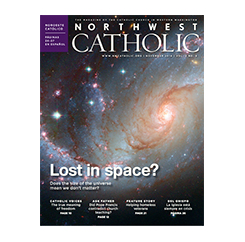View the 2022 Annual Parish Financial Report
View the 2021 Annual Parish Financial Report
View the 2020 Annual Parish Financial Report
View the 2019 Annual Parish Financial Report
View the 2018 Annual Parish Financial Report
Remembering Norma McCorvey, also known as “Jane Roe”…
By: Father Paul Schenck, OSV Newsweekly
Norma McCorvey, known to friends as “Miss Norma,” was a delightful, ruthlessly honest and transparent woman who was equal parts brash and humble. Her simplicity and unpretentiousness belied the pivotal role that she played in the greatest moral controversy of our time — the denial of personhood to unborn children and the subsequent legalization of abortion. As a troubled young woman who had suffered parental abandonment, sexual assault and drug abuse, she was enlisted as the plaintiff “Jane Roe” in the 1970 civil suit that would come to be known as Roe v. Wade. After acknowledging she was the anonymous “Roe,” Miss Norma admitted that she had lied about being raped, which had been the premise of her petition for a legal abortion. She never had an abortion; her daughter was born and adopted.
Today, Roe is seen as the touchstone of “reproductive rights” — whether a woman’s decision to end her pregnancy is constitutionally protected. For many Americans, Roe v. Wade is viewed as essential to women’s liberation from the social constraints of the past and as the passport to both political and economic success. For some time after Roe, Norma McCorvey championed this view by working in an abortion clinic and advocating the practice.
For many other Americans, abortion is a topic fraught with tragedy. In Roe, Justice Harry Blackman admitted to both his own, and the majority’s, ignorance of the meaning and even the definition of life. We now know that human life begins at conception — a fact recognized by the National Human Genome Research Institute as well as the Catholic Church. Abortions kill unborn children. Since 1973, more than 54 million unborn children have died by abortion. For her part, Miss Norma explained, “I didn’t know during the Roe v. Wade case that the life of a human being was terminated.” That knowledge came to her at a later time.
The first time I met Miss Norma was in 1996 at the National Memorial for the Pre-Born, an ecumenical prayer service to end abortion, which my brother, Rev. Rob Schenck, and I began in 1995 on Capitol Hill in Washington, D.C. We had heard that Miss Norma had received Christ as her Savior, had been baptized, had renounced her support of abortion, and was working in a pro-life pregnancy center offering women support in their decision against abortion. We invited her to join us in the nation’s capital to pray to end abortion, and she came. It was her first national media event since her conversion. I recall being struck by her cherubic smile, her girlish giggle and her joyous hugs. Her personal struggle was written in the lines of her face, but her new heart overwrote them.
Together with my brother, I was on the way to being a Supreme Court petitioner myself, with a case bearing my name: Rev. Paul Schenck v. Pro-Choice Network (1997). My brother and I had challenged a federal court order prohibiting sidewalk counseling and the dissemination of pro-life literature on public sidewalks in our home state of New York. While mine was a successful defense of our free speech right, the activity for which I was jailed was unmistakably opposed to Roe. Yet, there we were, Jane Roe and the pro-life activist, smiling and embracing each other.
I later invited Norma to my Protestant congregation to share her journey from being a bitter proponent of abortion to a joyful defender of the unborn and their mothers. She then met my mother, who too had suffered parental abandonment, her first husband’s tragic suicide and the struggle of single parenthood in the 1950s. They became fast friends, phoning each other, corresponding, and making a point of visiting one another whenever possible. I cherish the memories of their smiles, laughter and non-stop conversation when they were together.
Just as with her Supreme Court case, Norma preceded me in seeing in Catholicism the most appropriate home for her as a Christian and pro-life advocate. Her reception into full communion with the Catholic Church in 1998 by Father Frank Pavone of Priests for Life was an inspiration to me for my reception as a Catholic in 2004. After being ordained a priest, I had the privilege of celebrating Mass and serving Communion to Miss Norma and to my mother, who joined her as a Catholic. I now have the honor of remembering my sister in Christ at the altar in a Mass of Remembrance. I will be eternally grateful for Miss Norma’s friendship, courage and inspiration.
This article comes to you from OSV Newsweekly (Our Sunday Visitor) courtesy of your parish or diocese

